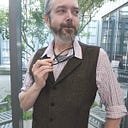Very interesting take! I mean, how many original commentaries on the statistics of Pew research can there possibly be? You found a way viewing it through the lens of fiction, which I appreciate. Thank you! Now I have a new fiction author to check out!
I highlighted that bit for a couple of reasons: 1) as a philosopher, I’m always skeptical of “criteria of truth” claims, but there is definitely something to the quoted author’s point of symbols guiding the faithful to the idea of self-negation. In fact, that is the entire point of most religious practices at a deep spiritual level. As a pragmatist, it is the intersection of symbol and practice (actual changes in one’s behavior) that holds truth value for me. And in my independent religious studies of Abrahamic as well as eastern and pagan wisdom traditions, the idea of giving up the self seems to me to be the intended goal of the various exoteric and esoteric practices, even if it’s not explicitly stated as such.
2) The yin-yang symbol of Taoism is probably one of the most direct symbols of self-negation. Then again, Taoism, as it is consumed by westerners, is more properly considered a philosophy rather than a religion. I would consider myself a Taoist philosopher, but wouldn’t dare claim any ties to Taoism as a religion and culture, because that would be highly dishonest of me. Just wanted to point out that the symbol and philosophy is all about self-negation, and if that is a criteria of truth for the symbol (and I would suspect for the philosophy too), then perhaps it should be considered in those types of conversations as well.
2 min readDec 29, 2022
Written by M W Thayer
Yet another white dude with yet another opinion. Is that opinion founded in Wisdom? I don't know, you tell me.
